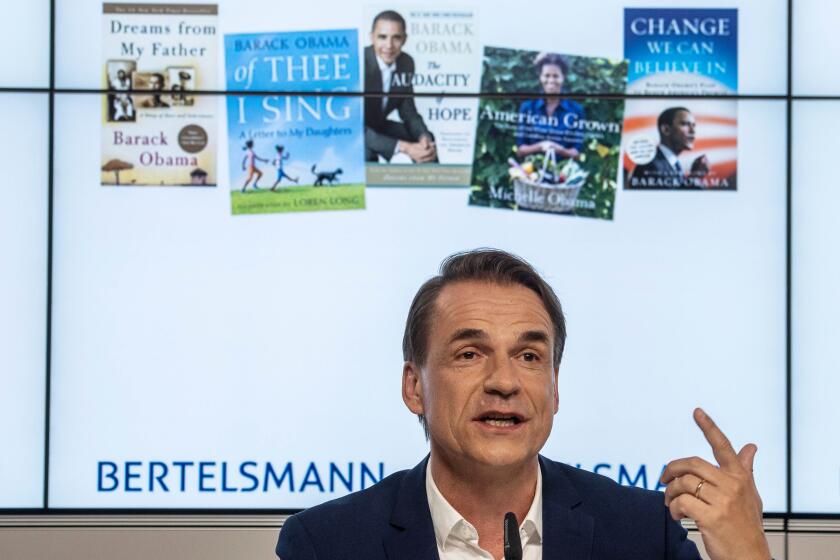Simon & Schuster CEO says there’s no need to be ‘nervous’ about new owner KKR

Paramount announced a deal Monday to sell Simon & Schuster, home to Stephen King, Taylor Jenkins Reid, Colleen Hoover and many bestselling nonfiction authors, to the private investment giant KKR for $1.62 billion after a $2-billion-plus sale to publishing giant Penguin Random House was nixed last October.
“We are pleased to have reached an agreement on a transaction that delivers excellent value to Paramount shareholders while also positioning Simon & Schuster for its next phase of growth with KKR,” said Bob Bakish, president and CEO of Paramount Global.
After the all-cash agreement closes, Simon & Schuster will become a standalone private company with Jonathan Karp, president and CEO, and Dennis Eulau, COO and CFO, still at the helm. KKR also announced plans to support the launch of a broad-based equity ownership program to provide the publisher’s more than 1,600 employees an opportunity to own shares in the company.
Karp told The Times on Monday that he thinks the deal is a “very exciting new chapter for book publishing.”
“KKR’s support and strategic guidance can make us even greater as a publishing company,” Karp said. “The idea of employee ownership is very powerful, and I don’t think it’s ever been tested on this scale — for a publishing company — the way that it’s going to be at Simon & Schuster. I think that giving employees the opportunity to participate in ownership is going to be galvanizing for the company. I think it’s going to make us a magnet for some of the best publishing talent and ultimately, some of the best writers.”
Asked whether he has any reservations about the acquisition, Karp says he’s confident Simon & Schuster will be publishing more books and publishing them better, and broadening the range of the books they publish.
“There is not a single cell in my body that is nervous about this,” he said. “You know, we’ve met with KKR over a period of months. I’ve known [KKR Chairman, Media] Richard Sarnoff for more than 20 years. I believe that they are committed to helping us grow and become even greater than we already are. ... And that I think is very good news for readers and publishers everywhere.”
The earlier sale to Penguin Random House was blocked by a federal judge who ruled that the proposed merger would violate antitrust laws by having the potential to “substantially” lessen competition “in the market for the U.S. publishing rights to anticipated top-selling books.”
Biden administration receives a clear victory, with the judge ruling the blockbuster merger would diminish competition in book publishing.
Although the KKR agreement still has the potential to reshape the industry, the decision to sell to a buyer outside of the “Big Five” publishers — which include Penguin Random House, Macmillan, HarperCollins and Hachette Book Group — may ensure the new deal goes through without Justice Department intervention.
The private equity industry has a reputation for layoffs and cost-cutting, and the firm’s acquisition could be seen as a blow to book publishing at large by those who worry an investment firm might prioritize profit over literature. But others see a benefit in KKR acquiring the publisher.
“I think it’s good news that a company that’s familiar with publishing bought S&S, and they’ve given clear signs that they want to support and invest in advancing the literary aims of S&S rather than stripping it for parts — which was always a risk, especially with private equity buys,” Ed Nawotka, a senior editor at Publishers Weekly, told The Times. “Folks who say things like, ‘Oh, they’re only going to publish bestsellers’ don’t understand books at all because what becomes a bestseller is wholly unpredictable.”
Nawotka noted KKR’s history with book publishing. The firm had owned RBMedia, a large audiobook company, before selling it last month, and in 2020 acquired OverDrive, the digital reading platform behind Libby, the popular app used by libraries. “The success of S & S will feed into the success of their other companies and vice versa,” said Nawotka. “ There’s a bit of a virtuous circle there, which is a positive potential development.”
“Simon & Schuster’s nearly 100-year history is a testament to the enduring value of creative expression through the written and spoken word,” Ted Oberwager, who leads the gaming, entertainment, media and sports verticals within KKR’s Americas Private Equity business, said in a statement. “We are thrilled to invest behind Jon and the immensely talented organization at Simon & Schuster to support their mission of delivering marquee content to readers around the world.”
Sarnoff added, “We see a compelling opportunity to help Simon & Schuster become an even stronger partner to literary talent by investing in the expansion of the company’s capabilities and distribution networks across mediums and markets while maintaining its 99 year legacy of editorial independence. We also believe the opportunity to create an ownership culture within one of the world’s top publishers has enormous potential to create value for all of Simon & Schuster’s stakeholders.”
Several organizations sent a letter to the Department of Justice on Friday urging it to stop Penguin Random House from purchasing Simon & Schuster.
In a letter to Simon & Schuster employees, Karp explained that discussions with KKR had been initiated this spring. He emphasized the potential for growth, the promise of increased investment and the equity deal.
“Meanwhile, it’s business as usual for all of us,” Karp noted in the letter. “As you have done so well throughout this process, let’s keep our noses in the books and our focus on delivering the best possible results for our authors and our distribution clients. That focus has been integral to our success and it’s the reason we can celebrate this outcome.”
More to Read
Sign up for our Book Club newsletter
Get the latest news, events and more from the Los Angeles Times Book Club, and help us get L.A. reading and talking.
You may occasionally receive promotional content from the Los Angeles Times.









